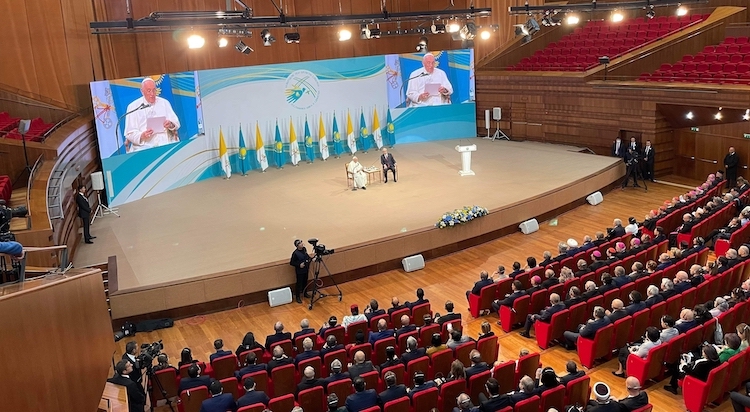By Kalinga Seneviratne
NUR-SULTAN, Kazakhstan (IDN) — “The whole world is experiencing the ongoing impact of the pandemic, conflicts, sanctions, climatic change and other global issues. We all see the increase in geopolitical tensions and conflicts across the globe,” said Maulen Ashimbayev, head of the Secretariat of the 7th Congress of Leaders of World and Traditional Religions on September 13. He was addressing a meeting of the Secretariat.
“Distrust between countries, wars, acts of terror, and lack of effective work by international organizations negatively affects the overall global situation. Against this backdrop, our forum can send an important signal to the international community as it calls for dialogue, overcoming contradictions, ending conflicts and achieving peace”, he added, speaking ahead of a two-day meeting in the Kazakh capital with Pope Francis giving the keynote address.
Kazakhstan, which prides itself on creating a multi-religious, multi-ethnic society living in comparative harmony, initiated the Congress in 2003 in the aftermath of the religious animosity created around the world after the 9/11 terrorist attacks. The first event attracted 17 delegations from 23 countries.
The Congress is convened every three years.
The 7th Congress, which began on September 14, attracted more than 100 delegations from 50 countries along with about 150 international and 500 local media.
A highlight of the Congress is the participation of Pope Francis, who arrived on September 13 for a three-day visit to Kazakhstan—the first such visit by a pontiff to the Central Asian country in 20 years. In this predominantly Muslim country—where 70 per cent of the population belongs to the Islamic faith—there are some 200,000 Catholics (mostly of Polish, German and Lithuanian origins) out of a population of 15 million.
On the evening of his arrival, the Pope held a joint meeting with representatives of civil society and diplomatic corps at the Kazakhstan Central Concert Hall, which was packed with over 1000 people.

< Credit: Katsuhiro Asagiri | INPS-IDN Multimedia Director
In welcoming Pope Francis, Kazakh President Kassym-Jomart Tokayev noted that for 30 years after independence from the Soviet Union, his country has put in place its own model of inter-ethnic and inter-religious accord based on the concept of “unity-in-diversity”. He pointed out that it is due to this experience that Kazakhstan has convened the Congress of Leaders of World and Traditional Religions.
“Since its inception in 2003, the Forum has served as a good example of how people can come together as one, despite their differences. I strongly believe that only dialogue, human fraternity, and respect will make coexistence and tolerance possible”, said Tokayev, while expressing appreciation to the pontiff for making the trip. Which he said would add value to the gathering and help to disseminate its message far and wide.
“We face the shortage of food in most undeveloped regions of the world. At the same time, geopolitical confrontation with the world’s most fragile powers (has)intensified, which leads to tensions increasing in various parts of the world,” Tokayev pointed out.
After praising Kazakhstan for creating a “healthy secular” society, the Pope argued that it is essential to step up diplomatic efforts to promote dialogue, which is necessary amid the current geopolitical tensions. “It’s time to learn not to aggravate enmity and stop strengthening opposing blocks. We need leaders, who at international level could promote mutual understanding and dialogue between peoples’ …. to build a more stable and peaceful world, taking care of new generations,” he said.
“This requires understanding, patience and dialogue with everyone. I repeat with everyone,” the pontiff stressed.
Pope Francis, who came to the stage in a wheelchair, also spoke about the need to overcome the “bane of corruption” so that people’s needs could be addressed rather than paying rhetorical attention to it. Referring to Kazakhstan’s mineral wealth, he warned that such wealth could create inequality. “Prosperity of society should not be the property of a few, but it has to be of many,” noted Pope Francis.
During a press conference organized by the foreign ministry on September 12, when asked by a journalist how can a Congress like this offer a constructive solution to interstate conflicts, Bulat Sarsenbayev, chairman of the board of the Nazarbayev Center for the Development of Interfaith and Inter-Civilization Dialogue, said that what makes the congress unique is the fact that, unlike other similar events, Kazakhstan attracts the leaders of the world religions, not only representatives.
But he acknowledged that the Congress “cannot solve all the issues” related to conflicts in the world. “We try to create a proper atmosphere, to propose initiatives and offer some steps, but it is a long way.”
Kazakh deputy Foreign Minister Roman Vassilenko, who chaired the press conference, added that the Congress’s final document would be sent to different international organizations and governments and disseminated through the media, especially social media outlets. We present it “as the voice of spiritual leaders, very influential people”.
Head of the Congress Secretariat Ashimbayev believes that spiritual leaders and religious figures will be able “to charge the ideological and spiritual vacuum with new meaning” if the Congress can “unite the global community under a common constructive agenda”. [IDN-InDepthNews — 14 September 2022]
Photo: Pope Francis addressing the Inter-religious conference in Kazakh capital Nur-Sultan. Credit: Katsuhiro Asagiri | INPS-IDN Multimedia Director
IDN is the flagship agency of the Non-profit International Press Syndicate.
This article is published under the Creative Commons Attribution 4.0 International licence. You are free to share, remix, tweak and build upon it non-commercially. Please give due credit.

